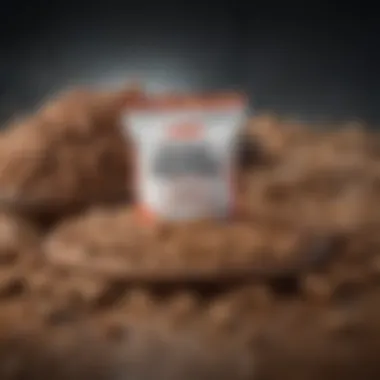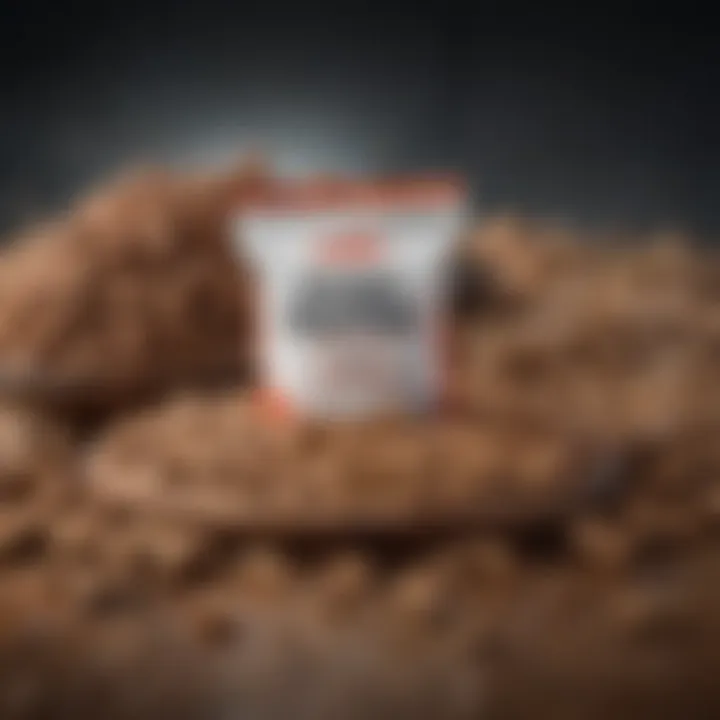Top Nutritious Snacks for Athletes and Sports Enthusiasts


Intro
Athletes and sports enthusiasts often overlook the critical role snacks play in their performance and recovery. Nutritious snacking is not merely a convenience; it is essential for maintaining energy levels, enhancing endurance, and facilitating recovery. The body requires a constant supply of fuel during physical activities. While whole meals are vital, snacks fill the gaps, especially during high-intensity training or competitions.
This guide delves into various snack options tailored explicitly for sports. You will find a spectrum of choices that cater to different nutritional needs, timing preferences, and portability. The objective is to equip you with the knowledge to make informed decisions about your snacking habits during sports activities.
Nutritional Needs of Athletes
Understanding the specific nutritional requirements is vital for optimizing performance. Athletes have diverse needs based on the intensity and duration of their activities. Generally, the focus should be on:
- Carbohydrates for energy
- Proteins for muscle repair
- Electrolytes for hydration
Athletes require a balanced intake of macronutrients to boost performance and aid recovery.
Carbohydrates are the primary energy source and should be included in snacks. Protein is crucial post-exercise for muscle recovery, while hydration is often neglected. Proper electrolyte levels maintain performance and prevent fatigue.
Timing of Snacks
The timing of snack consumption significantly impacts athletic performance. Pre-exercise snacks usually focus on carbohydrates to provide immediate energy. Post-exercise snacks should include proteins for repair and recovery. For optimal results, consider consuming snacks at specific intervals:
- 1-3 hours before activity: Focus on easily digestible carbs.
- Immediately post-activity: Incorporate protein and some carbohydrates.
- Within 24 hours: Balance between carbs and proteins to replenish.
Categories of Snacks
This guide provides a variety of snacks divided into categories to facilitate selection:
Protein-Rich Options
Protein bars, Greek yogurt, and beef jerky can be excellent sources. They not only provide sustenance but also support muscle repair.
Carbohydrate Sources
Fruits like bananas, apples, and whole-grain bread deliver essential carbs. Oatmeal cookies or energy balls are practical options.
Hydration Ideas
Sports drinks, coconut water, and electrolyte tablets help maintain proper hydration levels.
Portable Snack Choices
Nuts, mixed seeds, and trail mix are nutrient-dense and easy to carry. They fit conveniently in bags, making them great for on-the-go munching.
Recipe Overview
This section introduces various easy-to-make snacks that meet the outlined nutritional needs. These snacks are generally simple, requiring minimal ingredients while providing maximum benefits to the athlete. Each recipe takes into account the importance of taste, texture, and convenience, making them perfect for before, during, or after sports activities.
Origin and Cultural Significance
Some of the snacks might draw inspiration from various cultures, emphasizing how different societies have valued nutrition in sports. For example, energy bars can trace roots to ancient practices of ensuring athletes had easy access to nutritional foods.
Ingredients List
To prepare these snacks, certain ingredients are consistently appearing. A comprehensive list includes:
- Oats
- Nut butters (e.g., almond or peanut)
- Dried fruits (e.g., apricots, raisins)
- Seeds (e.g., chia, flax)
- Protein powder
Special Ingredient Notes
When sourcing ingredients, consider choosing organic options, especially for nut butters and oats. This enhances the overall health profile of your snacks. Additionally, gluten-free options are available for those with dietary restrictions, ensuring inclusivity in snacking.
Understanding these aspects provides clarity on how to effectively fuel your body for optimal athletic performance.
The Importance of Snacks in Sports
The significance of snacks in sports cannot be overstated. Adequate snacking provides necessary fuel, improves performance, and aids recovery. This section discusses the various reasons why integrating the right snacks into an athlete's regimen is crucial.
Understanding Nutritional Needs
Athletes have distinct nutritional requirements that differ from those of non-active individuals. These needs often vary based on the type and intensity of the sport. For example, endurance athletes require more carbohydrates to sustain energy levels, while strength sports might necessitate higher protein intake to support muscle recovery.
Individual body composition and metabolic rates should also influence snack choices. A tailored approach ensures that athletes receive essential vitamins, minerals, and macronutrients to not just survive but thrive during training and competition.
The right snack regimen forms the backbone of an athlete's nutrition plan.
The Role of Snacks in Performance
Snacks can play a pivotal role in enhancing a player's performance. Carbohydrates act as a quick source of energy, helping to maintain stamina and focus. Snacks laden with protein support muscle repair and growth, critical after strenuous workouts.
Ironically, inadequate snacking can lead to fatigue and diminish both physical and cognitive function. When the body lacks the necessary nutrients, it can compromise overall effectiveness and increase the risk of injury. Thus, careful consideration of snack content and timing is paramount.
Timing Your Snacks for Optimal Benefit
The timing of snacks is just as important as their content. Consuming snacks at strategic intervals can maximize energy levels and recovery processes.
- Pre-Workout: Consuming a carbohydrate-rich snack around 30-60 minutes before activity can enhance energy availability.
- During Exercise: For longer sessions, quick digestible snacks help maintain performance levels.
- Post-Workout: A combination of protein and carbohydrates facilitates recovery, making post-snack choices crucial for muscle repair and refueling.
Understanding the right times to snack can yield significant benefits in athletic performance. Thus, it is essential to map out a plan that prioritizes nutritional timing.
Categories of Snacks for Athletes
In the realm of sports, snacks serve an indispensable function. For athletes, the right types of snacks can significantly enhance performance. This section delves into various categories of snacks, emphasizing the importance of nutritional value, energy levels, and recovery potential as they relate to athletic activities. Understanding these categories equips athletes and enthusiasts alike with practical options to fuel their bodies effectively.


Protein-Rich Snacks
Greek Yogurt Parfaits
Greek yogurt parfaits are a highly regarded choice among athletes. They provide a rich source of protein, essential for muscle repair and growth. The creamy texture and versatility allow for a variety of toppings like fruits, nuts, and seeds, enhancing both flavor and nutrition.
The key characteristic of Greek yogurt is its increased protein content compared to regular yogurt. This feature makes it particularly suitable for individuals looking to maintain or gain muscle mass. Additionally, it contains probiotics which are beneficial for gut health. However, one should consider that some brands may contain added sugars, which can affect overall health impact.
Nut Butters and Fruits
Nut butters, combined with fruits, present a delightful and healthy snacking option. The protein and healthy fats from nut butters, such as almond or peanut butter, offer sustained energy, making them beneficial for athletes who require endurance during activities.
These snacks are also easy to prepare and consume on the go. Bananas, apples, or even whole-grain bread serve as excellent companions. A possible disadvantage is the higher caloric density in nut butters, which might not align with the dietary goals of every athlete.
Jerky Options
Jerky is a convenient source of protein, popular among athletes for its portability. Made from beef, turkey, or even plant-based options, jerky provides a chewy, flavorful snack that can easily fit into a gym bag.
The essential characteristic of jerky is its long shelf life, making it an ideal choice for long training sessions or travels. While it is high in protein, athletes should be mindful of sodium levels, as some jerky options can be quite salty.
Carbohydrate Sources
Whole Grain Energy Bites
Whole grain energy bites are small snacks that deliver a boost of energy through complex carbohydrates. These bites, often enhanced with nuts, seeds, and even dried fruits, can provide quick energy necessary for athletic performance.
Their primary appeal lies in their balance of carbohydrates and proteins, making them both nutritious and satisfying. While they are accessible to prepare at home, portion control is essential as they can lead to overconsumption due to their palatable nature.
Rice Cakes with Toppings
Rice cakes topped with an array of ingredients can satisfy various taste preferences. Whether adorned with nut butter, cheese, or avocado, rice cakes provide a light and crunchy base that athletes can customize.
The main advantage is their low-calorie content and ease of digestion, suitable for pre-exercise meals. However, the simplicity of rice cakes may not provide sufficient protein unless paired correctly.
Overnight Oats
Overnight oats have gained popularity for their convenience and nutritional value. By soaking oats overnight with milk or yogurt, this dish yields a fiber-rich snack packed with whole grains, making it an ideal choice for athletes.
The unique feature of overnight oats is their versatility, allowing various toppings. The downside may include preparation time, as they require advance planning, but the payoff in energy balance is often worth it.
Healthy Fats
Avocado Toast
Avocado toast combines healthy fats with a carbohydrate source, offering a satisfying snack. Rich in omega-3 fatty acids, avocados also provide potassium, assisting with muscle function.
This snack is appreciated for its creamy texture and flavor; topped with ingredients like eggs or tomatoes, it can be quite filling. Nonetheless, portion control is necessary due to the high caloric value of avocados.
Trail Mix Combinations
Trail mix provides an array of nutrients packed into one convenient snack. With a blend of nuts, seeds, and dried fruits, trail mix is excellent for quick energy on trails or during workouts.
The advantage lies in its customization potential, catering to different dietary preferences. However, individuals should monitor portions because trail mix can be calorie-dense.
Dark Chocolate Treats
Dark chocolate treats offer not just satisfaction but also health benefits, including antioxidants. Combined with nuts or fruits, dark chocolate can serve as a great post-workout treat.
While this snack can be quite pleasurable, moderation is important due to its sugar and fat content. It’s best used strategically, as the enjoyment can be offset by excessive calories.
Hydration Choices
Electrolyte Drinks
Electrolyte drinks are crucial for rehydrating after intense activity. These beverages replenish not just fluids but also essential minerals lost during sweating, supporting optimal performance.
The primary advantage is their ability to provide quick recovery, especially in endurance sports. However, athletes should be cautious of hidden sugars in some commercial products.
Coconut Water
Coconut water serves as a natural alternative to commercial sports drinks. It provides electrolytes, making it suitable for rehydration and less likely to contain artificial ingredients.
The gentle flavor is a plus for many; yet, athletes looking for longer-lasting energy may find coconut water insufficient without added carbohydrates.
Infused Water Recipes
Infused water adds flavor and nutrients without the added sugars. By infusing water with fruits, herbs, or vegetables, athletes can encourage hydration.
This option is beneficial as it offers variety in hydration strategies. However, the flavor might be too subtle for some. Resulting hydration gains largely depend on individual preference for taste.
Each snack category serves a purpose, enhancing the performance and recovery of athletes in their journey.
Pre-Exercise Snack Recommendations
When preparing for physical activity, the snacks consumed before exercise play a crucial role in determining performance and overall outcomes. Appropriate pre-exercise snacks can help optimize energy levels, enhance endurance, and support muscle growth. Additionally, knowledge of what to consume before workouts allows athletes to strategically fuel their bodies, ensuring they can perform at their best. In this section, we examine several aspects of pre-exercise snacking, including the benefits of low glycemic index foods, the importance of proper portion sizes, and the best timing for these snacks.
Low Glycemic Index Foods
Low glycemic index (GI) foods are essential for pre-exercise snacks because they provide a steady source of energy without causing spikes in blood sugar levels. This sustained energy release leads to improved stamina during workouts.
Some examples of low GI foods include:


- Whole grain bread
- Oatmeal
- Legumes
- Nuts and seeds
- Fruits like apples and oranges
Choosing these foods not only helps maintain your blood sugar but also prevents cravings during exercise. Maintaining stable energy levels assures you can focus on your performance, rather than being distracted by hunger or energy dips.
Portion Sizes and Combinations
Careful consideration of portion sizes and snack combinations can maximize the benefits of pre-exercise nutrition. Aiming for a balanced intake of carbohydrates, proteins, and fats can support better performance. It helps ensure you have enough energy while also preventing discomfort during exercise.
For instance, a snack following a 3:1 ratio of carbohydrates to protein can enhance muscle repair and energy levels. Examples of well-balanced combinations include:
- Greek yogurt with berries
- Peanut butter on whole grain toast
- Cottage cheese with fruit
Adequate portion size varies depending on individual needs. Generally, 100-200 calories from these snacks is ideal for most athletes, although more intense workouts may require additional energy.
Timing Your Pre-Workout Snack
The timing of your pre-workout snack is critical in maximizing its benefits. Consuming snacks too close to your workout may lead to gastrointestinal discomfort. On the other hand, eating too early could result in depleted energy levels by the time you start exercising.
As a guideline:
- Consume your snack around 30 to 60 minutes before your workout.
- If you have a lighter meal, consider having a small snack about 1 to 2 hours prior.
This strategy allows your body enough time to digest the snack, leading to a better workout experience.
"Proper pre-exercise nutrition is vital for achieving peak performance and enhancing recovery."
Understanding these elements makes for more effective planning. Tailoring your snacks to align with your individual needs and workout schedules can significantly enhance your overall athletic experience.
Post-Exercise Snack Strategies
After engaging in physical activity, the body requires specific nutrients to aid recovery. This section will focus on several important elements that contribute to effective post-exercise snack strategies. Understanding these strategies helps athletes optimize recovery and promote muscle repair.
Importance of Recovery Nutrition
Recovery nutrition plays a vital role in supporting overall athletic performance. After exercise, the body is in a state where it needs to replenish lost energy stores, rebuild muscle, and recover from fatigue. Providing adequate nutrients soon after a workout can help reduce muscle soreness and improve regeneration.
Research indicates that neglecting nutrition after exercise can lead to diminished performance in subsequent workouts. Therefore, it is essential for athletes to prioritize their recovery nutrition for long-term success in any sport.
Essential Nutrients for Recovery
To effectively recover, the body needs a mix of carbohydrates, proteins, and fats. Each macronutrient has a specific role:
- Carbohydrates help to refill glycogen stores depleted during exercise.
- Proteins are crucial for repairing and building muscle fibers.
- Fats contribute to overall health and provide sustained energy.
Moreover, vitamins and minerals are also important components that help with recovery by reducing inflammation and promoting healing. Electrolytes lost through sweat should also be replaced, ensuring proper hydration and electrolyte balance following physical exertion.
Easy-to-Prepare Post-Workout Snacks
In a busy lifestyle, convenient options for post-workout snacks can make a significant difference. Here are some practical ideas:
Smoothie Ideas
Smoothies are a popular choice for post-exercise recovery. They can easily be customized with various ingredients such as fruits, vegetables, and protein sources. Smoothies are rich in antioxidants and can hydrate the body well. A key characteristic of smoothies is their ease of preparation; they only require a blender and minimal time.
A unique aspect of smoothies is their versatility. Athletes can mix and match ingredients to address their needs, whether they require more protein, carbs, or healthy fats. Smoothies can be both refreshing and satisfying, making them a beneficial choice for any athlete.
Quick Protein Shakes
Protein shakes stand out due to their simplicity and efficiency. These shakes are designed to deliver a concentrated source of protein, making them ideal for muscle repair after intense workouts. The key feature of protein shakes is their quick digestion. This allows for rapid nutrient absorption, supporting recovery immediately.
However, using commercially available protein powders may have downsides. Some varieties contain added sugars or artificial ingredients, which can detract from their nutritional value if not selected carefully. Choosing high-quality protein sources is crucial for maximizing the benefits.
Nutritious Wraps
Nutritious wraps provide a savory option for post-exercise snacking. These wraps often combine protein, carbohydrates, and healthy fats in a portable format. They can include ingredients such as lean meats, hummus, or various vegetables, making them versatile.
One distinct feature of wraps is their customizability. Athletes can create wraps tailored to their taste preferences and dietary needs. However, wraps can also take longer to prepare compared to smoothies or shakes, which could be a consideration for those who prefer quicker options.
Overall, focusing on these snack strategies can enhance recovery and ensure that athletes are ready for their next activity.
Snacks for Endurance Sports
Snacks for endurance sports play a significant role in maintaining energy levels during prolonged activities. These snacks should be easily digestible, providing quick energy sources. Athletes involved in endurance sports like running, cycling, or triathlons often face unique challenges, including maintaining stamina, hydration, and muscle recovery. Selecting the right snacks can mitigate fatigue and improve overall performance. Snacks tailored for endurance activities focus on providing calories, nutrients, and hydration that fuel the body effectively.
Energy Gels and Chews
Energy gels and chews are popular in the realm of endurance sports. These products are designed to provide rapid energy in a compact format. They are easy to carry, making them perfect for long races or training sessions. An important element of energy gels is their carbohydrate content; typically, they offer simple sugars, which can be quickly absorbed by the body. This absorption can enhance performance by delivering a quick source of glucose to working muscles.
However, individuals should be cautious about their consumption. It is crucial to wash down gels with water to prevent gastrointestinal discomfort. Athletes should practice with gels to assess their effects before race day. This preparation allows athletes to find the right type and amount that best fuels their performance without causing issues during intense activities.
Fruits with High Water Content
Including fruits with high water content can significantly benefit endurance athletes. Options like watermelon, oranges, and cucumbers not only provide hydration but also deliver essential vitamins and minerals. These fruits are easy to digest and can be consumed as snacks before or during an event. High water content fruits help replenish lost fluids and electrolytes, particularly during hot weather conditions when hydration is of utmost importance. Moreover, they offer fiber, which supports overall digestive health.
Carrying fruits in compact forms, like sliced or cubed, can make them convenient. Pre-packaged options or homemade fruit snacks can easily fit in a gym bag, ensuring they are readily available for snacking.
Nutritious Bars
Nutritious bars are another key component of snacks for endurance sports. They can provide a balanced mix of carbohydrates, proteins, and fats. Many bars contain ingredients like oats, nuts, dried fruits, and seeds that offer a healthy energy boost. Athletes should select bars that do not contain excessive sugars or artificial additives as these can lead to crashes in energy levels.
When choosing nutritious bars, look for options with high fiber content; fiber helps in sustaining energy and can optimize digestive processes. Homemade bars also offer control over ingredients and can cater to personal dietary preferences. Prepare them in batches for easy consumption during training or events.


By focusing on the right snacks for endurance sports, athletes can enhance their performance through proper nutrition. Each option brings specific benefits that aid in maintaining energy and hydration.
Snacks for Strength Training
Strength training demands a unique approach to nutrition. The right snacks are crucial in supporting muscle growth and recovery. It's not just about lifting weights; it involves fueling the body with proper nutrients to enhance overall performance.
Building Muscle with Snacks
When it comes to building muscle, snacks can play a significant role. After a strength training session, the body needs protein to repair and build muscle fibers. This is where snacks can bridge the nutritional gap until the next meal. Consuming snacks rich in protein post-workout helps to stimulate muscle protein synthesis. Some snack options to consider are Greek yogurt and cottage cheese, both of which provide high levels of protein and are easy to digest.
In addition to protein, including carbohydrates in your snacks is beneficial. Carbs replenish glycogen stores depleted during workouts, promoting recovery. A simple peanut butter and banana toast can be an effective snack, offering a carbohydrate boost alongside protein.
High-Protein Snack Options
High-protein snacks are essential for individuals focusing on strength training. They help in muscle repair and maintenance. Here are some effective snack options:
- Hard-Boiled Eggs: These are portable and an excellent source of high-quality protein.
- Tuna Packs: Convenient and packed with protein, tuna can be eaten alone or mixed with Greek yogurt for added flavor and creaminess.
- Protein Bars: Look for those with minimal sugar and high protein content. Brands like Quest or RXBAR provide a good balance of nutrients.
Including these snacks post-workout can ensure the muscles have the necessary building blocks for recovery.
Balancing Macronutrients
While high-protein snacks are important, balancing macronutrients is vital. An ideal snack should combine protein, carbohydrates, and healthy fats. This balance is necessary for optimal energy levels and muscle repair. For example, a mixture of almond butter on whole grain crackers offers protein, carbs, and healthy fats.
Creating snacks with the right macronutrient ratio helps sustain energy levels throughout the day. It also aids in preventing fatigue during workouts. Learning to evaluate food labels to understand the macronutrient content of snacks can help in making informed choices.
Tip: Aim for a snack that contains approximately 20-30 grams of protein post-workout. This will aid in effective recovery and muscle growth.
With the right snacks in place, athletes can maximize their strength training efforts and ensure their nutritional needs are met, leading to better performance and results.
Convenient and Portable Snack Ideas
Convenience is key for athletes and fitness enthusiasts who lead busy lives. Portable snacks offer substantial benefits, ensuring quick nourishment without sacrificing nutrition. In sports, timing and quick access to energy can directly impact performance. Snacks that are easy to carry and consume allow for seamless integration into an athlete's routine. This section will explore practical snack options that athletes can take along, making it easier to maintain energy levels throughout the day.
Snack Packs for On-the-Go
Snack packs are a fantastic way to combine various nutrient-dense foods into a single, convenient option. They can be pre-prepared or bought ready-made, allowing for quick consumption during travel or breaks. Typical ingredients include nuts, dried fruits, and protein bars. Each pack can provide essential nutrients to fuel workouts or recovery. Having these snack packs ready not only saves time but also reduces the likelihood of opting for unhealthy choices when hunger strikes.
- Nutritional Value: Snack packs can be customized to meet specific dietary needs. Consider adding a mix of protein sources like almonds and Greek yogurt or high-fiber foods such as whole grain crackers and fruits.
- Variety and Enjoyment: Changing the ingredients regularly can keep things interesting. Experimenting with different flavors and textures can elevate the enjoyment of healthy snacking.
Making Wise Choices at Events
At sports events or social gatherings, unhealthy options are often plentiful. It is crucial to make smart choices that align with nutritional goals without feeling deprived. Athletes can prepare by seeking out healthier alternatives before the event or by packing portable snacks.
- Mindful Eating: Being conscious of portion sizes and understanding the nutritional value of food choices is important. Opting for grilled, baked, or steamed dishes rather than fried items can greatly enhance nutrient intake.
- When Possible, Ask Questions: Inquire about ingredients or preparation methods when dining out. Understanding what something contains can help in making better choices.
Meal Prepping Snacks
Meal prepping extends beyond dinner. Preparing snacks in advance saves both time and energy, ensuring that healthy options are readily available. Athletes can create a variety of snacks for the week, portioning them into zip-lock bags or containers for easy access.
- Options for Meal Prep: Some popular meal prep snacks include veggie sticks with hummus, blended smoothies stored in jars, or energy bites made from oats, nut butter, and honey.
- Benefits of Prepping: Meal prepping helps reduce the temptation to snack on processed foods. A well-planned snack can also provide optimal benefits surrounding workout times, enhancing performance and recovery.
Planning is essential. Proper preparation of snacks guarantees that athletes maintain high energy levels without compromising their dietary goals.
Cultural Snack Inspirations
Cultural snack inspirations are vital in the context of sports nutrition. They offer diverse options that can enhance the snacking experience through unique flavors and textures. By exploring snacks from various cultures, athletes can not only enjoy new tastes but also benefit from different nutritional profiles. This fusion of global culinary practices into sports snacks enriches the choices available, helping to meet the specific needs of athletes.
Different cultures have their own ideas about food. Understanding these variations can add excitement to mundane snack routines and encourage creativity in meal planning. Additionally, incorporating elements from various culinary traditions can provide athletes with a broader range of essential nutrients to support their performance.
"Food is not just fuel; it's an experience that can influence physical performance and enjoyment."
Global Flavors and Their Benefits
Exploring global flavors provides athletes with a chance to discover how different cultures approach nutrition. Each region has unique ingredients that can significantly contribute to athletic performance. For instance, Mediterranean diets rich in healthy fats from olive oil and nuts can provide sustained energy. Meanwhile, Asian cultures often use rice and vegetables, which are high in carbohydrates, facilitating quick energy release during intense training.
In addition to enhancing taste and variety, global flavors often come from whole, unprocessed ingredients. This focus on freshness offers athletes nutritious options for snacking, crucial for maintaining optimal energy levels. Understanding the benefits of these foods can inspire athletes to sharpen their dietary habits, moving toward more global, healthful options.
Unique Snack Ideas from Different Cultures
- Chickpea Snacks: Originating from Middle Eastern cuisine, roasted chickpeas provide a crunchy, high-protein snack option that can be seasoned with various spices.
- Rice Paper Rolls: A staple in Vietnamese cuisine, these wraps can be filled with vegetables, shrimp, or tofu, offering a refreshing snack rich in vitality.
- Mochi: This Japanese treat is made from glutinous rice and can be filled with various healthy fillings, making it both sweet and nourishing.
- Samosas: Popular in South Asian cuisine, baked samosas filled with lentils or veggies can serve as a savory snack rich in fiber.
- Hummus with Fresh Vegetables: A popular dip from the Mediterranean, hummus when paired with crunchy raw vegetables breaks the monotony and is packed with nutrients.
Incorporating diverse cultural snack ideas not only broadens the palate but also ensures that snack options remain exciting and fulfilling. This approach encourages athletes to explore and innovate their dietary routines, ultimately leading to a more enjoyable sporting experience.
Concluding Thoughts on Snack Selection
In the realm of athletics and physical activities, the selection of snacks plays a pivotal role not only in performance but in overall well-being. Athletes must understand that the right snacks can significantly influence energy levels, recovery times, and even motivation. This article has explored a variety of aspects concerning snack choices. From pre- and post-exercise options to convenient snacks, each category holds specific benefits tailored for different situations.
Some essential elements to reflect on include nutritional density and timing. Snacks rich in protein and healthy carbs are crucial for sustaining energy, while proper timing can enhance recovery or pre-game readiness. Athletes must carefully evaluate their snack routines against their training schedules and personal needs.
"Snack selection is not merely about fueling the body; it’s about optimizing performance and ensuring longevity in one’s athletic career."
This necessitates a deeper consideration of one’s unique requirements during training and competition phases. Keeping a consistent evaluation of snack choices allows athletes to adjust based on performance feedback and energy demands.
Evaluating Your Snack Routine
To maximize benefits from snacks, athletes should periodically review their snack routines. This involves journaling the types of snacks consumed, their timing, and the resultant energy levels experienced during workouts or competitions. An effective routine is characterized by diversity in snack types, ensuring a well-rounded intake of essential nutrients. Here are a few steps to evaluate your snack routine:
- Track Energy Levels: Note how each snack affects your energy during workouts.
- Diverse Choices: Ensure a mix of protein, carbs, and fats in your snacks.
- Stay Hydrated: Don't forget to consider hydration choices alongside solid snacks.
As an athlete, you should aim for a balance based on personal responses to various snacks. Adjusting intake can lead to better performance and less fatigue.
Adjusting Based on Activity Level
Athletes engage in different types of training that may require varying nutritional needs. For instance, a sprinter may need quick energy sources, whereas a long-distance runner may benefit from endurance snacks. Here are some considerations for adjusting snacks based on activity level:
- Intensity: High-intensity workouts may require more immediate energy through quick-digesting carbs, such as bananas or energy gels.
- Duration: Longer workouts can necessitate snacks that combine carbs and proteins, like a peanut butter sandwich or trail mix, to sustain energy over time.
- Recovery Needs: After intense sessions, focus on protein-rich snacks to help muscle repair and recovery.
Ultimately, athletes should remain flexible. As training habits change, so should their snack strategies. Listening to one's body is crucial in finding the right balance for peak performance.



